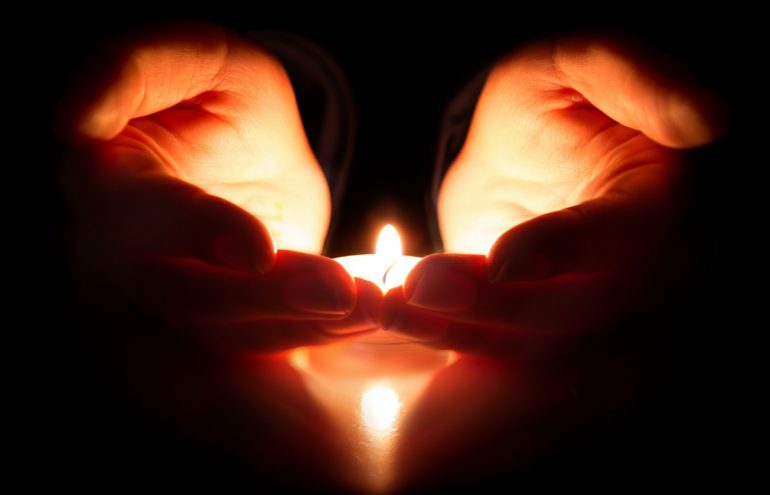Over the past several weeks I have been trying to help our parents with their groceries and errands to make sure that they do not put their health at risk. And so, once a week, in the early morning, before stores open, I line up along with other daring shoppers to fill our grocery orders. It is an interesting experience in today’s day and age to line up to purchase your staples, hoping that the shelves are not bare and that you can actually get everything on your list. Yet, what struck me more than anything on these trips is the kindness of the shoppers and the store clerks. Everyone is smiling. People politely excuse themselves and back up their carts to maintain the respectable two meter distance between one another, chuckling softly, when the polite attempts turn two meters into four. And yet, I am certain, that they are shopping at those times because they are elderly and have no one to do it for them, or they have lost their jobs and are trying to stock up on rice and beans, or they are separated from family for the upcoming chag and are preparing Passover for the first time on their own. Yet, despite everyone’s worries and stress, there is a special aura permeating the aisles. People almost have a special glow about them.
This week’s parasha, parashat Tzav, offers a detailed description of several sacrificial offerings that were to be brought to the altar. The sages teach that the sacrificial offerings are symbols of the animalistic natures within us that we must learn to subdue. They are the manner in which our negative traits are transformed into positive attributes that strengthen our relationship with Hashem. When these negative traits are subjugated to the divine, then the fire of the altar can truly extinguish the negative.
In describing the fire on the altar, it is written: “A fire burning on the altar must not go out” (Vayikra 5:5). The fire was never allowed to die out. It was to constantly be tended to and kindled as necessary to insure that the flames constantly ascended. As the Jewish heart is the spiritual altar, how much more so must we make sure to tend to its fire? Thus “the flame in the heart which aspires longingly upward, must be constantly added to; aided and strengthened through reason, wisdom and discernment – with the illumination of mitzvot and the light of the Torah (Oros Hakodesh Zevachim 91).
Rabbi Abraham J. Twerski suggests that this passage is a call for positive thinking, a call to maintain our composure in difficult times and not to allow ourselves to be crushed in the face of a challenge. Thus, he writes, “A person who has a burning passion for uniting with G-d can withstand adversity, and can think positively even under the most stressful circumstances.”
Rabbi Chaim of Volozhin suggests that no matter the challenges one faces in life, he must always be sure that the torch of his commitment to Torah burns strongly. Quite poetically, in a similar vein, the Lubavitcher Rebbe suggests that “by keeping our enthusiasm fired, the Divine flame within us will eventually burn away all impediments to joyful, holy living. The fire can only work its magic if it is kept burning, any lapse in enthusiasm is an opportunity for pessimism to creep in.”
Rabbi Menachem Mendel of Kotzk suggests that this passuk is actually telling parents to teach their children not to allow daily concerns to extinguish “their flame of love and fear of G-d”. Accordingly, the Talmud tells us that one must teach their child a trade and how to swim (Kiddushin 29a).
The Kotzker Rebbe explains that in teaching your child a trade, it is important to take a cue from swimming. To swim, you must immerse yourself completely in the water, but to survive, you must keep your head above the water. Similarly, in business, you must throw yourself into it fully, but one should keep their head clear in order to survive spiritually. King David said it clearly : “When you eat the labour of your hands you are praiseworthy, and all is well with you” (Psalms 128:2). To which the Kotzker Rebbe adds: ‘”You are praiseworthy and all is well when your labour is limited to your hands”.
The current pandemic is the most stressful of circumstances that we have ever known and that hopefully, we will ever know in our lifetime. It is natural and even understandable that our thoughts will stray to the pessimistic, the depressive and the hopeless. Yet thoughts are just that, they are thoughts, they are strings of consciousness and not fact. But they do have power over our emotions and, to a certain extent, over our physiology. Staying positive and hopeful, keeping our heads above the water in these challenging times is hard. But we all have it in us to dig deep within ourselves, to rely on our faith and push aside those “impediments to joy”. Look around yourselves. Though we are socially distanced from one another, people are reaching our more than ever, making efforts to connect with long lost friends and estranged family. Neighbours are helping each other, young are taking care of old, people are looking in on one another and finding kind words to bolster each other. These are all incredible traits that we constantly lamented to be lost on a generation living in the digital world. There is a miraculous transformation of society taking place. We must now, more than ever, keep those fires burning and keep our heads about us. This too shall pass, and if we keep those fires burning within us, we will emerge stronger than ever.
Shabbat Shalom,
Dr. Laura Segall
Head of School

